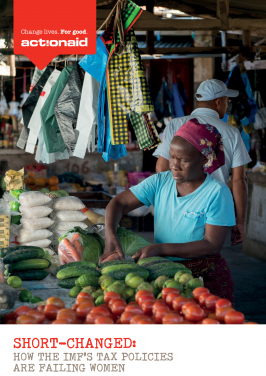Short-changed: How the IMF's tax policies are failing women
This briefing argues that the IMF must urgently analyse the differentiated impacts of its tax policy advice on men and women, particularly women living in poverty.
Executive summary
Gender responsive tax and expenditure policies should be at the heart of the IMF’s efforts to tackle gender inequality, but they currently are not.
We believe the IMF should switch its focus away from largely regressive indirect taxes, such as Value-Added Tax (VAT), towards more progressive taxes that are directly linked to income and wealth, such as Personal Income Tax (PIT), Corporate Income Tax (CIT), Capital Gains Tax (CGT) and Property Tax.
If the IMF was to make its tax policy advice consistent with an objective to reduce gender inequality, then advice should be grounded in evidence for taxes which will be gender-just and progressive and play the most meaningful role in redistributing wealth to ensure the rights of all women and girls are fulfilled. Progressive taxes ensure that individuals as well as businesses with higher incomes pay a higher share of their income or pro ts in tax.
Because gender discrimination means that women generally earn less than men and have less pro table and productive enterprises, a progressive system of taxation would prevent women on low incomes from being locked into, or pushed further into, poverty because of heavy tax payments. It would also support the fulfillment of their wider social and economic rights by funding quality, gender responsive public services, infrastructure and social protection.
